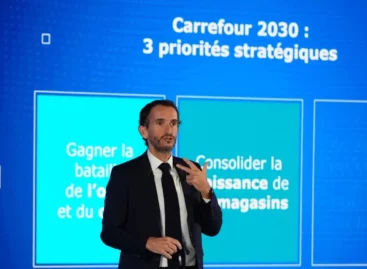An opportunity out of compulsion: Hungarian e-retailers can win by crossing the border
The appearance of Temu caused a bigger market shock in domestic e-commerce than the coronavirus epidemic and the war in Ukraine. A thoughtful use of AI can stand out from the competition, but this new technology also gives cybercriminals a tool to create manipulated offers. Where to next, what is the future of e-commerce, what are the opportunities, what are the challenges? David Chmelař, CEO of the Heureka Group, XX. The opening speaker of the e-commerce conference casts his vote in favor of marketplaces, price comparison sites and cross-border e-commerce. And Arthur Keleti, a futurist at Cybertit, draws attention to the shortcomings of the protection capabilities of SMEs.
Economic cycles already shape e-commerce, cyber security must be treated much more prominently

E-commerce is constantly developing, although the era of heroes is over. Dr. György Bőgel, president of Ecommerce Hungary, at the XX. In connection with the e-commerce conference, he said that a small sector can withdraw itself from the general economic trends and can even go against them, as e.g. the financial crisis of 2007-2008 was barely felt by online commerce. But if a sector already outgrows itself, it starts to move together with economic cycles and is carried by the force of gravity. Between 2012 and 2019, there was an economic golden age in Hungary, then came the epidemic and the recession, which seriously shook everyone. Foreigners are pressing in, everyone wants to sell, is looking for a market, and has no inhibitions. In the meantime, technology is developing unstoppably, new things are coming one after the other. “All new things also brought illusions, they bring with them. Our job is to remain grounded in reality and explain what lies behind each exciting phenomenon, to point out the mercilessly prevailing economic and market laws, the logic of development,” said Dr. György Bőgel, president of Ecommerce Hungary, who regarding this year, he sees challenges and opportunities in the following areas: artificial intelligence, marketplaces, appearance abroad. Regarding cyber security, he points out that it is a very important topic, but small and medium-sized enterprises do not deal with it enough.
“Of the SMEs, only one in four or five continuously improve their protection capabilities, and among the smallest companies, perhaps one in ten”
– said Arthur Keleti, a futurist of cyber secrets, who also shared that he sees the digital preparedness of the neighboring countries as higher. In his view, Hungarians are not early risers, which is also true for digital technologies. That is why many Hungarian startups do not even test certain advanced digital services at home.
Related news
Forced paths: trends and decisions in 2026
🎧 Hallgasd a cikket: Lejátszás Szünet Folytatás Leállítás Nyelv: Auto…
Read more >








